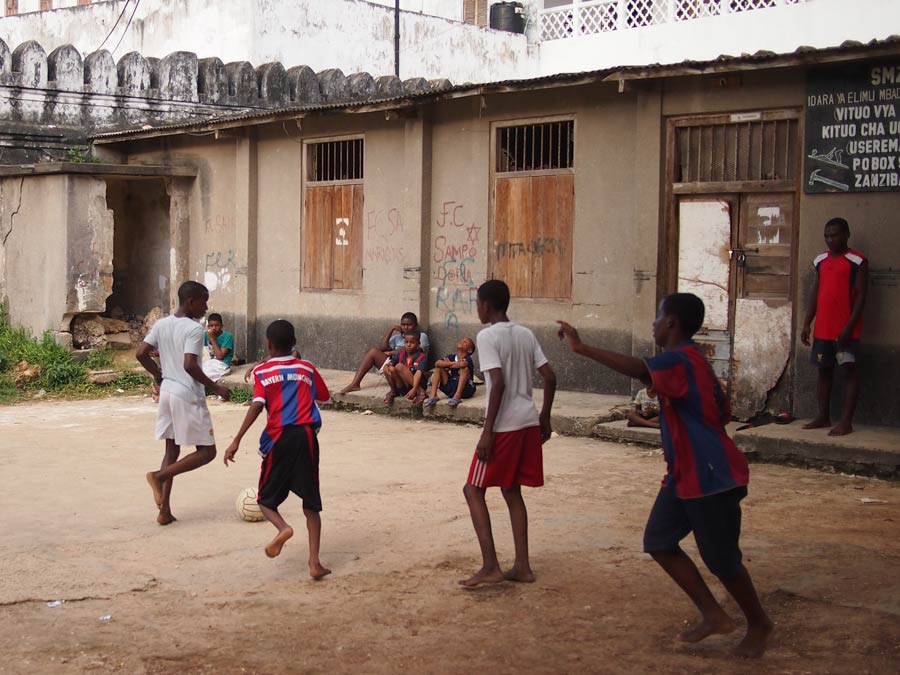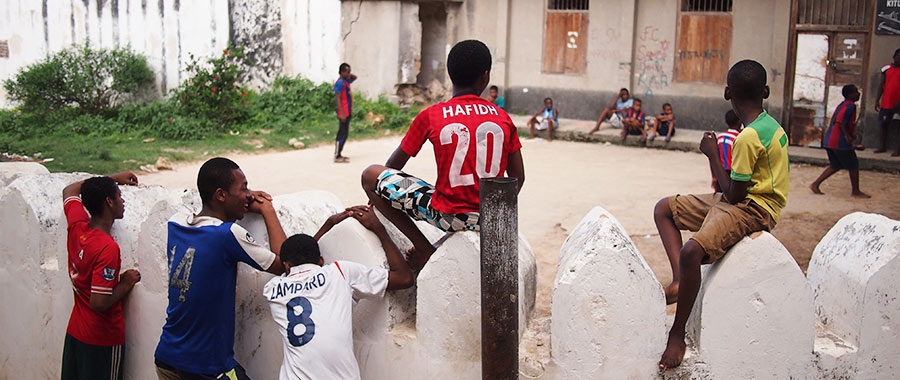The views expressed in our content reflect individual perspectives and do not represent the authoritative views of the Baha'i Faith.
In a society that waits for politicians or millionaires to solve all problems, how do we encourage youth to become change agents? The junior youth spiritual empowerment program has one answer.
The Baha’i community developed the junior youth empowerment program in response to the need for an educational framework that channels youth’s energies towards benefitting their communities. Focused on youth between the ages of 12 and 15 (or junior youth), the free program serves those at a crucial point of development—the early teenage years, when youth burst with potential, and at the same time are particularly vulnerable to the 1 influences of materialism, peer pressure, fear and prejudice.
Based on the Baha’i belief that every individual is a “mine rich in gems of inestimable value,” (Baha’u’llah, Tablets of Baha’u’llah, p. 161) the program envisions young people as already possessing the nascent skills the program cultivates: they want to change the world around them, and to belong to a group with a spirit of unity.
Regardless of gender, race or social class, junior youth in the Spiritual Empowerment Program advance through a sequence of books and develop a team spirit through acts of community service they carry out together. This connection serves as a support system that centers them in a constructive, nurturing environment which helps them develop their skills:
As this generation of youth assumes the responsibilities of conducting the affairs of society, it will encounter a landscape of bewildering contrast. On the one hand, the region can justly boast brilliant achievements in the intellectual, technological and economic spheres. On the other, it has failed to reduce widespread poverty or to avoid a rising sea of violence that threatens to submerge its peoples. Why—and the question needs to be asked plainly—has this society been impotent, despite its great wealth, to remove the injustices that are tearing its fiber apart? …
What is called for is a spiritual revival, as a prerequisite to the successful application of political, economic and technological instruments. But there is a need for a catalyst. Be assured that, in spite of your small numbers, you are the channels through which such a catalyst can be provided. – The Universal House of Justice, from a message dated 8 January 2000.
In a time of global struggle, when people are becoming more and more despondent, falling into a state of cynicism and apathy towards the world’s problems, and always waiting for others to take action, the junior youth program has particular importance for the progress of any community.
All of these concepts came to life in front of our eyes one day in Tanzania, when my friend and I met a junior youth group in an empty soccer field: a dusty rectangle between a maize field and an abandoned house. Most of them were boys ages 11-14, and all eighteen of them had determined expressions on their faces. We sat facing them.
 We had come to fill in for a travelling animator—the older youth who guides the group throughout all their activities—and assist with any plans. As we talked, they explained to us their dilemma: the neighborhood kids wanted a new soccer ball (as we spoke, two boys were unsuccessfully trying to patch up the old one) but they don’t have the funds to buy one. Naturally, we asked them if they were interested in carrying out a project.
We had come to fill in for a travelling animator—the older youth who guides the group throughout all their activities—and assist with any plans. As we talked, they explained to us their dilemma: the neighborhood kids wanted a new soccer ball (as we spoke, two boys were unsuccessfully trying to patch up the old one) but they don’t have the funds to buy one. Naturally, we asked them if they were interested in carrying out a project.
They looked at each other with a mix of excitement and hesitation. “What sort of project?” they asked. One of the older boys, in a purple shirt, looked skeptical. He spoke up, unsure about the support neighboring adults could offer, doubting the commitment of his friends. “Why don’t we just all put in some money and buy it?”
“But not everyone has enough money,” another boy pointed out. “And then some will have more of a right to the ball than others. There might be arguments. It’s better if we do something where we can all participate.”
We tried to think of something we could do to raise funds—something that might involve all the young people interested in procuring a new ball. Could we sell some sort of food?
They immediately exclaimed “Corn!”, because roasted corn is common street food that everyone enjoys, and isn’t that hard to make. Even the boy in the purple shirt became excited. Some debate ensued about who could bring what; would everyone be able to contribute? Where exactly would they sell it? Would explaining the purpose of their project encourage neighbors to buy from them?
As they discussed animatedly, a man walked towards us. Walking in the sun, he asked us if he could join us in the shade. We said yes, but returned our focus to the junior youth.
The junior youth started to realize how much effort would have to go into a project like this one, even for a one-time corn sale. They wondered who would contribute the coal; would people buy from them? The shy ones worried that people might laugh.
Suddenly, the man raised his hand. All eyes turned to him in surprise.
“What are you doing all this for?” he asked. He seemed genuinely kind, but I thought I knew what he wanted to say before he even said it. As the boys nearest to him explained that they wanted a soccer ball, my friend and I met each other’s eyes with dismay.
The man made our fears come true. “I could buy the ball for you,” he offered with a generous smile.
He seemed unbelievably kind, and the group bursted into applause and cheers. But my friend and I were disappointed; since we were trying to encourage this group of junior youth to take ownership of their reality, and independently find solutions to the problems they have without waiting for someone to do it for them–even when it’s something as simple as purchasing a ball.
But the boy in the purple shirt shushed his friends. “Wait,” he said. “It’s not right for this man to buy the ball for us. Aren’t we supposed to be the ones who make the effort? What if something happens to the ball; will we feel responsible to care for it, or will we just wait for another generous person to come our way and give us what we want?”
Silence fell, and the man seemed shocked. The members of the group looked at each other pensively for a moment, and then they all nodded. One of them looked up at the man. “Thank you, sir,” he said politely. “But no thank you.”
We left soon after, with the promise that next Sunday, we would meet and make the official preparations. In the meantime, the kids promised to speak to their families and make arrangements. They all waved at us as we walked away.
The man stopped us as we left. “I didn’t understand what you wanted to do,” he said. His eyes shone as he looked at the group of boys, now involved in a game of soccer with their old, deflated ball. “But I understand now. This is good. God bless you.”
The goal of obtaining a new ball for neighborhood soccer games may seem a frivolous one, but these are attitudes that inspire youth to own their education, to reach beyond the prejudices and fears of previous generations, and take up the reins of the progress of their own communities.
Too many people wait for the government or some manner of social aid to help, or feel resigned to living a monotonous life of suffering. But these bright-eyed junior youth who stand at the brink of adolescence have hope; they have plans. They just need encouragement and guidance:
Rejecting the low sights of mediocrity, let them scale the ascending heights of excellence in all they aspire to do. May they resolve to elevate the very atmosphere in which they move, whether it be in the school rooms or halls higher learning, in their work, their recreation, their Baha’i activity or social service. Indeed let them welcome with confidence the challenges awaiting them. – The Universal House of Justice, from a letter to Baha’i Youth around the World, May 8, 1985.
The junior youth spiritual empowerment program began in 2006, and continues to develop as experience grows. Currently, over 150,000 junior youth are engaged in 17,000 groups in over 2,600 communities around the world, and numbers are steadily rising as more people witness the program’s transformative power and the how it can benefit their communities.
















Comments
Sign in or create an account
Continue with Googleor